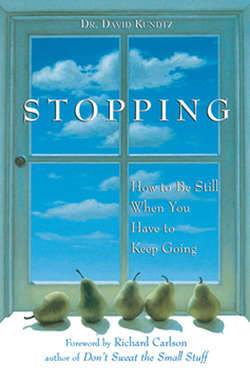Читать книгу Stopping - David Kundtz - Страница 10
На сайте Литреса книга снята с продажи.
ОглавлениеI have a very full and busy lifeand occasionally I am asked,“Scotty, how can you do all that you do?”The most telling reply I can give is,“Because I spend at least two hours a daydoing nothing.”
M. SCOTT PECK
3
Doing Nothing
The first time I became aware of Stopping, I was hiding. I was on the run and felt lost. I was trying to figure out what to do with my life and didn't really know what was happening to me or how it would all turn out.
I had been a successful and content Catholic priest for fifteen years, but all of a sudden I was in crisis. Nothing felt right anymore. My enthusiasm for my vocation had abandoned me. For the first time in my life I felt lonely. I avoided responsibilities, denied what was happening, and made some foolish decisions. Finally, not knowing what to do, I stopped doing everything. I escaped to a small, isolated cabin, perched high on a hill overlooking the Pacific Ocean on the northern California coast, for a month to figure it out.
I just stopped. And in so doing, I found my way again. I didn't stop on purpose, but it was the best thing I could have done for myself. It was not until much later, after many occasions of Stopping, some as short as ten seconds and others as long as a month, that I became conscious of its value and could actually define it:
Stopping is doing nothing as much as possible, for a definite period of time (one second to one month) for the purpose of becoming more fully awake and remembering who you are.
This is the simple practice upon which this book is built, a new skill to replace cramming and cutting that can help deal with the Mountain of Too Much. Doing nothing should not be confused with a total lack of activity. Doing nothing is indeed doing something very important. It's allowing life to happen— your life. Doing nothing is something quite profound.
The ultimate purpose of Stopping is to ensure that when we do go, we go in the direction that we want and that we are not just reacting to the pace of our lives, but choosing, moment by moment, what's best. The ultimate reason for Stopping is going. Going is what we of the industrialized Western world are known for. It's what we do best: get on with business, get things done, accomplish feats, and assume roles of leadership and power. So Stopping at first glance might not seem so desirable, it may even appear to be opposed to our fundamental values. But, not only is it not against these values, Stopping maintains and cultivates them. Without being awake and remembering our values and identity—in other words, without Stopping—our going can get us into deep trouble.
Stopping, even in its shortest form, allows you to realize the essential meanings of your life and to consistently remember what is truly important to you so you can keep your priorities in order and up-to-date. It helps you know what you want to achieve and how you want to behave.
Stopping works where cramming and cutting don't, because it calls a time-out and gives you the freedom to reorganize the game of life according to your own rules; to recognize your true priorities. It creates an oasis where the turbulent waters caused by the demands of daily life can quiet and where, in the stillness, you can again see your own reflection. It gives you time to be, not just to do.
Stopping is born of personal experience and, like many useful ideas, came to me because I needed it so badly. In most cases, we don't stop until we feel overwhelmed and don't know where to turn. For some reason, when I got to the end of my rope, I just did nothing and waited, not out of any virtuous inclination, not because I thought the waiting would solve anything, but because I didn't know what else to do.
Now I can look back and see the value in that time of waiting: There were moments, short and long (but mostly short), in which I remembered some important information about myself, became more awake to my life, and became aware of all the aspects involved in the issue I was dealing with. Stopping helped me get going again, but going in a focused and determined way, rather than a scattered and chaotic one.
So this book is about Stopping, and specifically about Stopping when you feel you have to keep going. This kind of quieting and self-remembering is designed specifically to fit the needs of people who must live their lives at an ever-increasing speed and with an overwhelming number of demands upon them. And because that description fits many of us, chances are you are feeling overwhelmed and overloaded in your life and are looking for something—anything—to relieve the strain. If so, you've come to the right place. Stopping will help. And it's easy. You can do it anywhere at anytime.
